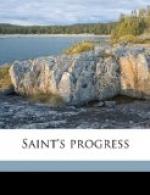as conscience bade him rendered him unfit to keep
his parish, all was built on sand, had no deep reality,
was but rooted in convention. Charity, and the
forgiveness of sins honestly atoned for—what
became of them? Either he was wrong to have espoused
straightforward confession and atonement for her, or
they were wrong in chasing him from that espousal.
There could be no making those extremes to meet.
But if he were wrong, having done the hardest thing
already—where could he turn? His Church
stood bankrupt of ideals. He felt as if pushed
over the edge of the world, with feet on space, and
head in some blinding cloud. ‘I cannot
have been wrong,’ he thought; ’any other
course was so much easier. I sacrificed my pride,
and my poor girl’s pride; I would have loved
to let her run away. If for this we are to be
stoned and cast forth, what living force is there in
the religion I have loved; what does it all come to?
Have I served a sham? I cannot and will not
believe it. Something is wrong with me, something
is wrong—but where—what?’
He rolled over, lay on his face, and prayed.
He prayed for guidance and deliverance from the gusts
of anger which kept sweeping over him; even more for
relief from the feeling of personal outrage, and the
unfairness of this thing. He had striven to be
loyal to what he thought the right, had sacrificed
all his sensitiveness, all his secret fastidious pride
in his child and himself. For that he was to
be thrown out! Whether through prayer, or in
the scent and feel of the clover, he found presently
a certain rest. Away in the distance he could
see the spire of Harrow Church.
The Church! No! She was not, could not
be, at fault. The fault was in himself.
‘I am unpractical,’ he thought.
’It is so, I know. Agnes used to say so,
Bob and Thirza think so. They all think me unpractical
and dreamy. Is it a sin—I wonder?’
There were lambs in the next field; he watched their
gambollings and his heart relaxed; brushing the clover
dust off his black clothes, he began to retrace his
steps. The boys were playing cricket now, and
he stood a few minutes watching them. He had
not seen cricket played since the war began; it seemed
almost otherworldly, with the click of the bats, and
the shrill young ’voices, under the distant
drone of that sky-hornet threshing along to Hendon.
A boy made a good leg hit. “Well played!”
he called. Then, suddenly conscious of his own
incongruity and strangeness in that green spot, he
turned away on the road back to London. To resign;
to await events; to send Noel away—of those
three courses, the last alone seemed impossible.
‘Am I really so far from them,’ he thought,
’that they can wish me to go, for this?
If so, I had better go. It will be just another
failure. But I won’t believe it yet; I
can’t believe it.’
The heat was sweltering, and he became very tired
before at last he reached his omnibus, and could sit
with the breeze cooling his hot face. He did
not reach home till six, having eaten nothing since
breakfast. Intending to have a bath and lie down
till dinner, he went upstairs.




